2005年考研英语完形填空真题解析
2005年考研英语完形填空真题解析
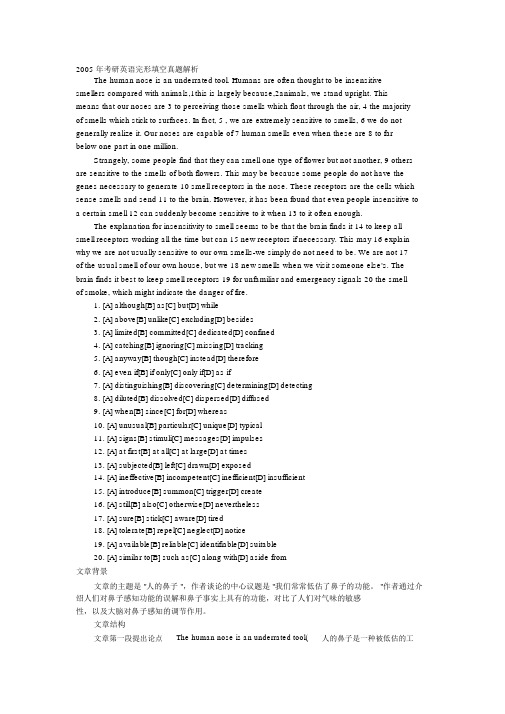
2005 年考研英语完形填空真题解析The human nose is an underrated tool. Humans are often thought to be insensitivesmellers compared with animals,1this is largely because,2animals, we stand upright. Thismeans that our noses are 3 to perceiving those smells which float through the air, 4 the majorityof smells which stick to surfaces. In fact, 5 , we are extremely sensitive to smells, 6 we do not generally realize it. Our noses are capable of 7 human smells even when these are 8 to farbelow one part in one million.Strangely, some people find that they can smell one type of flower but not another, 9 others are sensitive to the smells of both flowers. This may be because some people do not have the genes necessary to generate 10 smell receptors in the nose. These receptors are the cells which sense smells and send 11 to the brain. However, it has been found that even people insensitive to a certain smell 12 can suddenly become sensitive to it when 13 to it often enough.The explanation for insensitivity to smell seems to be that the brain finds it 14 to keep all smell receptors working all the time but can 15 new receptors if necessary. This may 16 explain why we are not usually sensitive to our own smells-we simply do not need to be. We are not 17of the usual smell of our own house, but we 18 new smells when we visit someone else's. The brain finds it best to keep smell receptors 19 for unfamiliar and emergency signals 20 the smellof smoke, which might indicate the danger of fire.1.[A] although[B] as[C] but[D] while2.[A] above[B] unlike[C] excluding[D] besides3.[A] limited[B] committed[C] dedicated[D] confined4.[A] catching[B] ignoring[C] missing[D] tracking5.[A] anyway[B] though[C] instead[D] therefore6.[A] even if[B] if only[C] only if[D] as if7.[A] distinguishing[B] discovering[C] determining[D] detecting8.[A] diluted[B] dissolved[C] dispersed[D] diffused9.[A] when[B] since[C] for[D] whereas10.[A] unusual[B] particular[C] unique[D] typical11.[A] signs[B] stimuli[C] messages[D] impulses12.[A] at first[B] at all[C] at large[D] at times13.[A] subjected[B] left[C] drawn[D] exposed14.[A] ineffective[B] incompetent[C] inefficient[D] insufficient15.[A] introduce[B] summon[C] trigger[D] create16.[A] still[B] also[C] otherwise[D] nevertheless17.[A] sure[B] stick[C] aware[D] tired18.[A] tolerate[B] repel[C] neglect[D] notice19.[A] available[B] reliable[C] identifiable[D] suitable20.[A] similar to[B] such as[C] along with[D] aside from文章背景文章的主题是 "人的鼻子 ",作者谈论的中心议题是 "我们常常低估了鼻子的功能。
2005考研英语真题答案
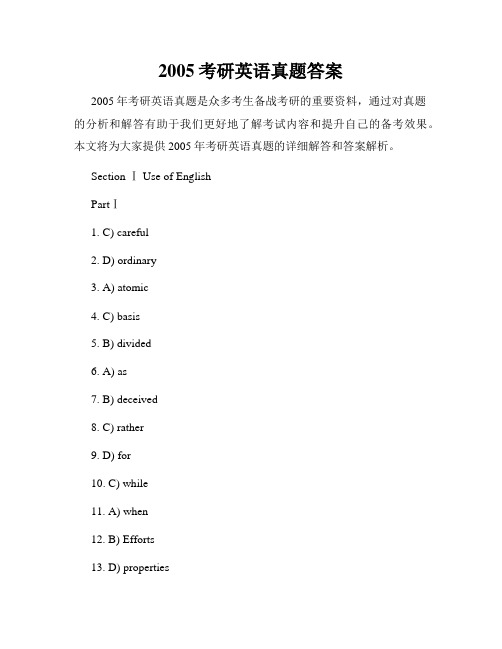
2005考研英语真题答案2005年考研英语真题是众多考生备战考研的重要资料,通过对真题的分析和解答有助于我们更好地了解考试内容和提升自己的备考效果。
本文将为大家提供2005年考研英语真题的详细解答和答案解析。
Section Ⅰ Use of EnglishPartⅠ1. C) careful2. D) ordinary3. A) atomic4. C) basis5. B) divided6. A) as7. B) deceived8. C) rather9. D) for10. C) while11. A) when12. B) Efforts13. D) properties14. A) impact15. D) currently PartⅡ16. C) provide17. B) evidence18. D) starves19. A) reluctance20. D) In essence21. A) challenges22. B) general23. C) simply24. B) wrong25. C) threatening Part Ⅲ26. C) and27. B) ideas28. C) themselves29. D) preferred30. A) taking31. D) promising32. B) until33. A) establish34. D) do35. B) experiencePart Ⅳ36. manufacturing37. frustrated38. challenge39. squeezed40. neglectedSection Ⅱ Reading ComprehensionPart A41. B) it changes the basic nature of desire.42. D) They create desires and then satisfy them.43. C) the dominance of external objects in consumption.44. D) People always have an inclination to desire more.45. A) They relate it to practical achievements.46. C) They are awakening new needs through advertising.47. A) have realized the importance of desires.48. C) Industrialization plays an important role in consumption.49. B) It encourages people to prefer material things.50. D) about people's dependence on the moods of desire.Part B51. C) The reform of the educational system.52. D) The persisting inequality between urban and rural areas.53. A) They believed that ordinary people would succeed.54. C) Encouraging the population to seek further education.55. A) Hesitations over the potential rewards from education.56. B) Recognize the importance of promoting social equality.57. D) Settle for whatever they could achieve through labor.58. B) The disappointment caused by the success of a few individuals.59. A) The rapid advancement of society.60. D) Lack of educational opportunity for all groups.Part C61. D) Enhancing their chances of winning at slots.62. C) Their potential generosity towards others.63. D) They believe they can exert control over the outcome.64. A) They were given money unambiguous control.65. C) The belief in luck.66. B) greater likelihood of gambling.67. A) It is independent of people's social and educational backgrounds.68. D) Information obtained from research.69. B) The spread of gambling.70. D) Life chances in general.Section Ⅲ WritingPart Ⅳ Translation71. TranslationThis year, China's economic reforms have made remarkable achievements. The country's GDP has increased steadily, and people's lives have significantly improved. However, we should not ignore the environmental problems that have arisen in the process of economic development. For example, air pollution and water pollution have become increasingly serious. In order to achieve sustainable development, the Chinese government has implemented a series of measures to address these issues. It has invested heavily in environmental protection projects and enacted laws and regulations to hold polluters accountable. Additionally, the government has encouraged the use of clean energy and promoted green and low-carbon development. It is believed that with the joint efforts of the government and the public, China's environmental situation will gradually improve, and the people will be able to enjoy a better living environment.72. TranslationWith the rapid development of the Internet, online shopping has gained popularity among consumers. Compared to traditional shopping, online shopping offers convenience and flexibility. People can easily browse and compare products from different sellers and make purchases with just a few clicks. Online shopping also provides a wide range of choices, allowing consumers to find specific items that may not be available in local stores. Furthermore, online shopping often offers discounts and promotional deals, making it a cost-effective option. However, there are also potential risks associated with online shopping, such as the quality of products, the security of personal information, and the reliability of sellers. Therefore, consumers should be cautious and take necessary precautions when making online purchases.以上是2005年考研英语真题的详细解答和答案解析,通过对真题的研究和分析,我们可以更好地了解考试内容和备考重点,从而提高备考效果。
2005年考研英语(一)完形填空重要词汇汇总

2005年考研英语(一)完形填空重要词汇汇总这是一篇社会生活类文章,主要是讲述了人的鼻子为什么对有些气味是不敏感的。
文章中的单词难度适中,基本没有超纲词汇,但是逻辑词和长难句偏多,可能会影响同学们的理解。
同样,文章中出现了许多高频重点单词,以下是本文中出现的10个,就让我们一起来学习吧!1. 13expose [ɪk'spoz]vt. 揭露,揭发;使曝光;显示【词根记忆】:ex(在…前面)+pose(姿势)→expose(在其前面摆好姿势,显示)【短语搭配】:expose to 暴露; 使暴露; 使曝光; 暴露于expose uncover 使暴露; 暴露于【真题例句】:However, it has been found that even people insensitive to a certain smell at first can suddenly become sensitive to it when exposed to it often enough.然而我们却发现,即使刚开始对某种气味不敏感的人,如果常常接触该气味,那么他也会突然变得对这种气味敏感了。
(2005年完型填空)2. 2inefficient [ɪnɪ'fɪʃ(ə)nt]adj. 无效率的,效率低的;无能的【词根记忆】:in(否定前缀)+efficient(有效的)→inefficient(无效率的,效率低的)【短语搭配】:expose to 暴露; 使暴露; 使曝光; 暴露于expose uncover 使暴露; 暴露于Auto Expose 自动曝光【真题例句】:The explanation for insensitivity to smell seems to be that brain finds it inefficient to keepall smell receptors working all the time but can creat new receptors if necessary. 看来,对嗅觉不灵的解释应该是:大脑发现让所有嗅觉感受器都始终工作的话效率太低,但是在必要时却能产生新嗅觉感受器。
考研英语05年真题

考研英语05年真题考研英语05年真题分析在2005年的考研英语试卷中,我们可以看到试题的整体难度适中,既考察了考生的英语基础能力,也测试了他们的综合运用能力。
以下是对这一年真题的详细分析。
首先,阅读理解部分包含了四篇文章,每篇文章后面都附有五个问题。
这些文章涵盖了科技、经济、文化和社会等多个领域,要求考生具备广泛的知识面和较强的逻辑推理能力。
例如,第一篇关于科技的文章,不仅要求考生理解文章的主旨大意,还要求他们能够捕捉细节信息,如作者的观点、论据以及结论。
其次,完形填空部分的难度相对较高。
这部分不仅考察了考生的词汇量和语法知识,还要求他们能够根据上下文的逻辑关系来推断空缺处的最合适选项。
这要求考生不仅要有扎实的英语语言基础,还要具备良好的语篇理解能力。
作文部分是考研英语的重头戏,2005年的作文题目要求考生就“网络对人际关系的影响”这一话题发表自己的看法。
这不仅考察了考生的写作能力,还考察了他们对社会现象的洞察力和批判性思维。
考生需要在有限的时间内,组织语言,构建论点,并且给出合理的论据来支持自己的观点。
翻译部分则考察了考生的双语转换能力。
这部分要求考生将中文段落翻译成英文,或者将英文段落翻译成中文。
这不仅要求考生有较高的词汇量和语法知识,还要求他们能够准确把握原文的意图和风格,进行恰当的语言表达。
总的来说,2005年的考研英语真题体现了对考生英语综合运用能力的全面考察。
考生在备考时,应该注重提高自己的词汇量、语法知识、阅读理解能力、写作技巧和翻译能力。
同时,也要关注社会热点问题,提高自己的批判性思维和社会洞察力。
通过系统的复习和练习,相信考生能够在考研英语中取得理想的成绩。
05年考研英语真题答案
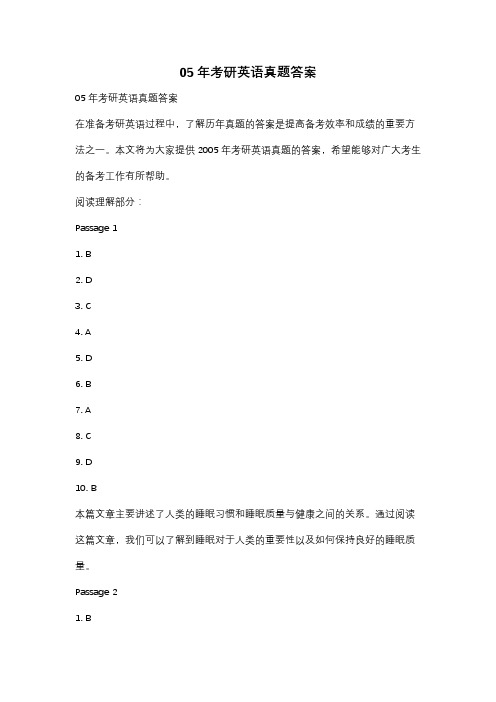
05年考研英语真题答案05年考研英语真题答案在准备考研英语过程中,了解历年真题的答案是提高备考效率和成绩的重要方法之一。
本文将为大家提供2005年考研英语真题的答案,希望能够对广大考生的备考工作有所帮助。
阅读理解部分:Passage 11. B2. D3. C4. A5. D6. B7. A8. C9. D10. B本篇文章主要讲述了人类的睡眠习惯和睡眠质量与健康之间的关系。
通过阅读这篇文章,我们可以了解到睡眠对于人类的重要性以及如何保持良好的睡眠质量。
Passage 21. B2. C3. A4. C5. D6. B7. A8. D9. C10. B这篇文章主要讲述了全球气候变暖对动植物的影响。
通过阅读这篇文章,我们可以了解到全球气候变暖对生态系统的破坏以及人类应该如何应对气候变化。
Passage 31. C2. D3. A4. B5. C6. D7. B8. A9. C10. B这篇文章主要讲述了人类对自然资源的过度开发和环境破坏。
通过阅读这篇文章,我们可以了解到人类应该如何保护环境和可持续发展的重要性。
完形填空部分:1. D2. B3. A4. C5. D6. B7. A8. C9. B10. A11. D12. C13. B14. D15. A16. C17. D18. B19. A20. C这篇完形填空文章主要讲述了一个人在经历了失败和挫折后如何重新找到自己的动力和信心。
通过阅读这篇文章,我们可以了解到人类在面对困难时应该如何积极面对和克服困难。
翻译部分:1. 他们在夜晚举行了一次会议,以讨论如何解决这个问题。
2. 这个项目需要更多的资金和人力资源才能顺利进行。
3. 这个新发现对于科学界来说具有重要的意义,它可能改变我们对宇宙的理解。
4. 在过去的几年里,这个城市发生了很大的变化,它变得更加现代化和繁荣。
5. 这个问题的解决需要政府和公民共同努力。
以上是2005年考研英语真题的答案,希望对广大考生的备考工作有所帮助。
2005考研英语真题详解

2005考研英语真题详解2005考研英语真题详解2005年的考研英语真题是很多考生备考过程中经常研究的一份试卷。
本文将对这份试卷进行详细解析,帮助考生更好地理解和掌握英语考试的要点和技巧。
第一部分:阅读理解这部分共有三篇文章,每篇文章后面有5个问题。
文章内容涉及科技、文化、教育等多个领域,考察考生的阅读理解能力和对不同主题的理解。
第一篇文章是关于科技创新的。
文章介绍了美国国家科学基金会(NSF)的一项研究,该研究旨在探索科技创新对经济增长的影响。
问题主要围绕研究的目的、方法和结果展开,考生需要仔细阅读文章并理解其中的关键信息。
第二篇文章是关于文化差异的。
文章讲述了一个跨文化交流的案例,强调了文化差异对沟通和合作的影响。
问题主要涉及案例中的挑战和解决方案,考生需要通过阅读理解文章中的细节和逻辑关系,找到正确的答案。
第三篇文章是关于教育改革的。
文章讨论了英国高等教育体系的变革,并对其影响进行了分析。
问题主要针对变革的原因、目标和影响进行提问,考生需要通过阅读文章理解作者的观点和论证。
第二部分:完形填空这部分共有两篇短文,每篇短文后面有10个空格需要填写正确的单词。
文章内容涵盖了社会问题、人际关系等多个方面,考察考生的词汇理解和语境推测能力。
第一篇短文是关于社会责任的。
短文描述了一个社会活动家的经历,强调了每个人都应该承担起社会责任。
考生需要根据上下文的逻辑关系和词汇的语义,填写合适的单词,使整个短文通顺和连贯。
第二篇短文是关于人际关系的。
短文讲述了一个人在工作中遇到的困难和挑战,以及他通过与同事合作解决问题的经验。
考生需要根据上下文的逻辑关系和词汇的语义,填写合适的单词,使整个短文通顺和连贯。
第三部分:概括大意和完成句子这部分共有两篇短文,每篇短文后面有5个问题。
文章内容涵盖了科技、环境、教育等多个领域,考察考生的理解和概括能力。
第一篇短文是关于科技创新的。
短文介绍了一项新的科技创新,强调了其对环境和能源的积极影响。
2005年高考英语完形填空真题详解
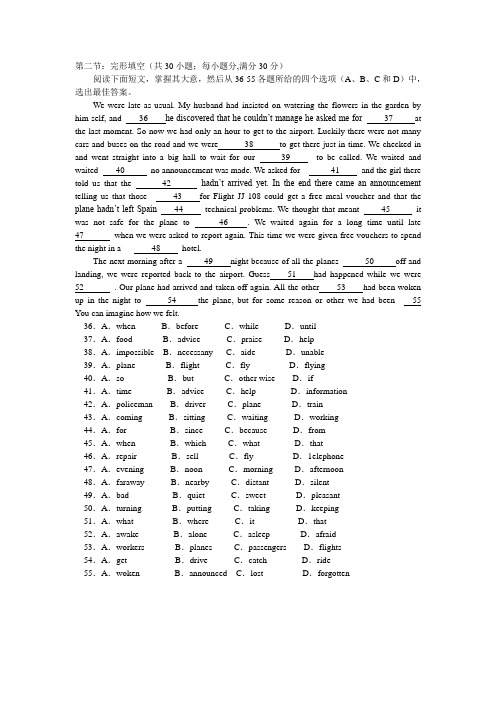
第二节:完形填空(共30小题;每小题分,满分30分)阅读下面短文,掌握其大意,然后从36-55各题所给的四个选项(A、B、C和D)中,选出最佳答案。
We were late as usual. My husband had insisted on watering the flowers in the garden by him-self, and 36 he discovered that he couldn’t manage he asked me for 37 at the last moment. So now we had only an hour to get to the airport. Luckily there were not many cars and buses on the road and we were 38 to get there just in time. We checked in and went straight into a big hall to wait for our 39 to be called. We waited and waited 40 no announcement was made. We asked for 41 and the girl there told us that the 42 hadn’t arrived yet. In the end there came an announcement telling us that those 43 for Flight JJ 108 could get a free meal voucher and that the plane hadn’t left Spain 44 technical problems. We thought that meant 45 it was not safe for the plane to 46 . We waited again for a long time until late 47 when we were asked to report again. This time we were given free vouchers to spend the night in a 48 hotel.The next morning after a 49 night because of all the planes 50 off and landing, we were reported back to the airport. Guess 51 had happened while we were 52 . Our plane had arrived and taken off again. All the other 53 had been woken up in the night to 54 the plane, but for some reason or other we had been 55 You can imagine how we felt.36.A.when B.before C.while D.until37.A.food B.advice C.praise D.help38.A.impossible B.necessany C.aide D.unable39.A.plane B.flight C.fly D.flying40.A.so B.but C.other wise D.if41.A.time B.advice C.help D.information 42.A.policeman B.driver C.plane D.train43.A.coming B.sitting C.waiting D.working44.A.for B.since C.because D.from45.A.when B.which C.what D.that46.A.repair B.sell C.fly D.1elephone47.A.evening B.noon C.morning D.afternoon48.A.faraway B.nearby C.distant D.silent49.A.bad B.quiet C.sweet D.pleasant50.A.turning B.putting C.taking D.keeping51.A.what B.where C.it D.that52.A.awake B.alone C.asleep D.afraid53.A.workers B.planes C.passengers D.flights54.A.get B.drive C.catch D.ride55.A.woken B.announced C.lost D.forgotten。
考研英语一真题手译完形填空2005
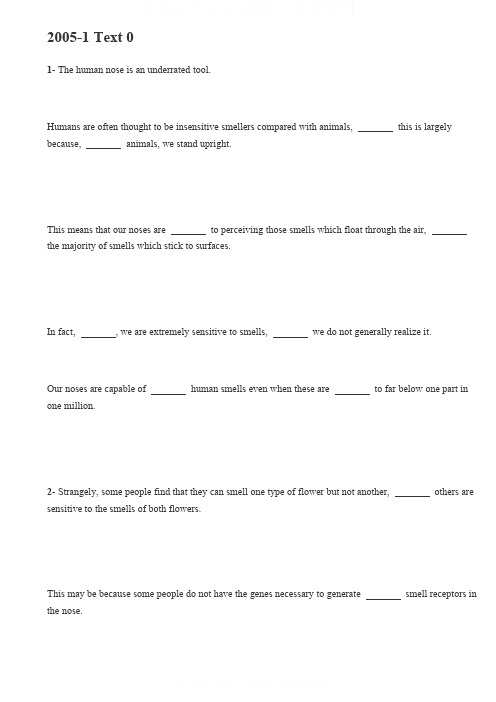
, we are extremely sensitive to smells,
we do not generally realize it.
Our noses are capable of one million.
human smells even when these are
to far below one parke, which might indicate the danger of fire.
分享考研资料,助力考研成功!
sensitive to it when
to it often enough.
can suddenly become
3- The explanation for insensitivity to smell seems to be that the brain finds it
receptors working all the time but can
2- Strangely, some people find that they can smell one type of flower but not another, sensitive to the smells of both flowers.
others are
This may be because some people do not have the genes necessary to generate the nose.
smell receptors in
分享考研资料,助力考研成功!官方认证店铺:考研资料These receptors are the cells which sense smells and send
【考研必备】2005年考研英语真题及解析
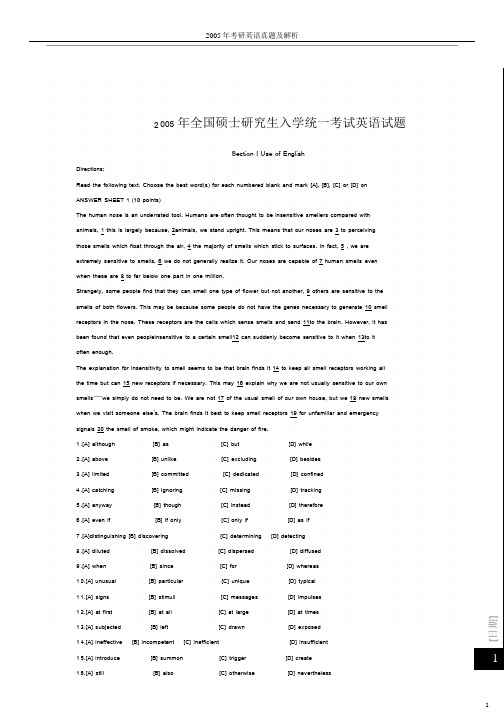
[日期] 2 005 年全国硕士研究生入学统一考试英语试题Section I Use of EnglishDirections:Read the following text. Choose the best word(s) for each numbered blank and mark [A], [B], [C] or [D] on ANSWER SHEET 1 (10 points)The human nose is an underrated tool. Humans are often thought to be insensitive smellers compared with animals, 1 this is largely because, 2animals, we stand upright. This means that our noses are 3 to perceiving those smells which float through the air, 4 the majority of smells which stick to surfaces. In fact, 5 , we are extremely sensitive to smells, 6 we do not generally realize it. Our noses are capable of 7 human smells even when these are 8 to far below one part in one million.Strangely, some people find that they can smell one type of flower but not another, 9 others are sensitive to the smells of both flowers. This may be because some people do not have the genes necessary to generate 10 smell receptors in the nose. These receptors are the cells which sense smells and send 11to the brain. However, it has been found that even peopleinsensitive to a certain smell12 can suddenly become sensitive to it when 13to it often enough.The explanation for insensitivity to smell seems to be that brain finds it 14 to keep all smell receptors working all the time but can 15 new receptors if necessary. This may 16 explain why we are not usually sensitive to our own smells —we simply do not need to be. We are not 17 of the usual smell of our own house, but we 18 new smells when we visit someone else’s. The brain finds it best to keep smell receptors 19 for unfamiliar and emergency signals 20 the smell of smoke, which might indicate the danger of fire.1 2 3 4 5 6 7 8 9 1 1 1 1 1 .[A] although .[A] above [B] as [C] but [D] while[B] unlike [B] committed [B] ignoring [B] though [B] if only [C] excluding [C] dedicated [C] missing [C] instead [C] only if [D] besides[D] confined[D] tracking[D] therefore[D] as if.[A] limited .[A] catching .[A] anyway .[A] even if .[A]distinguishing [B] discovering [C] determining [D] detecting.[A] diluted .[A] when [B] dissolved [B] since [C] dispersed [C] for [D] diffused[D] whereas[D] typical0.[A] unusual 1.[A] signs [B] particular [B] stimuli [B] at all [C] unique [C] messages [C] at large [C] drawn [D] impulses[D] at times[D] exposed[D] insufficient2.[A] at first3.[A] subjected [B] left4.[A] ineffective [B] incompetent [C] inefficient1 1 1 27.[A]sure[B]sick[C]aware[C]neglect[D]tired[D]notice8.[A]tolerate9.[A]available0.[A]similar to[B]repel[B]reliable[C]identifiable[D]suitable[B]such as[C]along with[D]aside fromSection II Reading ComprehensionPart ADirections:Read the following four texts.Answer the questions below each text by choosing[A],[B],[C]or[D].Mark your answers on ANSWER SHEET1.(40points)Text1Everybody loves a fat pay rise.Yet pleasure at your own can vanish if you learn that a colleague has been given a bigger one.Indeed,if he has a reputation for slacking,you might even be outraged.Such behaviour is regarded as“all too human”,with the underlying assumption that other animals would not be capable of this finely developed sense of grievance.But a study by Sarah Brosnan and Frans de Waal of Emory University in Atlanta,Georgia,which has just been published in Nature,suggests that it is all too monkey,as well.The researchers studied the behaviour of female brown capuchin monkeys.They look cute.They are good-natured,co-operative creatures,andthey share their food readily.Above all,like their female human counterparts,they tend to pay much closer attention to the value of“goods and services”than males.Such characteristics make them perfect candidates for Dr.Brosnan’s and Dr.de Waal’s study.The researchers spent two years teaching their monkeys to exchange tokens for food.Normally,the monkeys were happy enough to exchange pieces of rock for slices of cucumber.However,when two monkeys were placed in separate but adjoining chambers,so that each could observe what the other was getting in return for its rock,their behaviour became markedly different.In the world of capuchins grapes are luxury goods(and much preferable to cucumbers).So when one monkey was handed a grape in exchange for her token,the second was reluctant to hand hers over for a mere piece of cucumber.And if one received a grape without having to provide her token in exchange at all,the other either tossed her own token at the researcher or out of the chamber,or refused to accept the slice of cucumber.Indeed, the mere presence of a grape in the other chamber(without an actual monkey to eat it)was enough to induce resentment in a female capuchin.The researchers suggest that capuchin monkeys,like humans,are guided by social emotions.In the wild,they are a co-operative,group-living species.Such co-operation is likely to be stable only when each animal feels it is not being cheated.Feelings of righteous indignation,it seems,are not the preserve of people alone.Refusing a lesser reward completely makes these feelings abundantly clear to other members of the group.However, whether such a sense of fairness evolved independently in capuchins and humans,or whether it stems from the common ancestor that the species had35million years ago,is,as yet,an unanswered question.21.In the opening paragraph,the author introduces his topic by________.[ [ [ [A]posing a contrastB]justifying an assumptionC]making a comparisonD]explaining a phenomenon22.The statement“it is all too monkey”(Last line,Paragraph l)implies that________.[ [ [ [A]monkeys are also outraged by slack rivalsB]resenting unfairness is also monkeys’natureC]monkeys,like humans,tend to be jealous of each otherD]no animals other than monkeys can develop such emotions23.Female capuchin monkeys were chosen for the research most probably because they are________.[A]more inclined to weigh what they get[B]attentive to researchers’instructions[C]nice in both appearance and temperament[D]more generous than their male companions24.Dr.Brosnan and Dr.de Waal have eventually found in their study that the monkeys________.[ [ [ [A]prefer grapes to cucumbersB]can be taught to exchange thingsC]will not be co-operative if feeling cheatedD]are unhappy when separated from others25.What can we infer from the last paragraph?[A]Monkeys can be trained to develop social emotions.[B]Human indignation evolved from an uncertain source.[C]Animals usually show their feelings openly as humans do.[D]Cooperation among monkeys remains stable only in the wild.Text2Do you remember all those years when scientists argued that smoking would kill us but the doubters insisted that we didn’t know for sure?That the evidence was inconclusive,the science uncertain?That the antismoking lobby was out to destroy our way of life and the government should stay out of the way?Lots of Americans bought that nonsense,and over three decades,some10million smokers went to early graves.There are upsetting parallels today,as scientists in one wave after another try to awaken us to the growing threat of global warming.The latestwas a panel from the National Academy of Sciences,enlisted by the White House,to tell us that the Earth’s atmosphere is definitely warming and that the problem is largely man-made. The clear message is that we should get moving to protect ourselves.The president of the National Academy, Bruce Alberts,added this key point in the preface to the panel’s report:“Science never has all the answers.But science does provide us with the best available guide to the future,and it is critical that our nation and the worldbase important policies on the best judgments that science can provide concerning the future consequences of present actions.”Just as on smoking,voices now come from many quarters insisting that the science about global warming is incomplete,that it’s OK to keep pouring fumes into the air until we know for sure.This is a dangerous game:by the time100percent of the evidence is in,it may be too late.With the risks obvious and growing,a prudent people would take out an insurance policy now.Fortunately,the White House is starting to pay attention.But it’s obvious that a majority of the president’s advisers still don’t take global warming seriously.Instead of a plan of action,they continue to press for more research—a classic case of“paralysis by analysis”.To serve as responsible stewards of the planet,we must press forward on deeper atmospheric and oceanic research.But research alone is inadequate.If the Administration won’t take the legislative initiative,Congress should help to begin fashioning conservation measures.A bill by Democratic Senator Robert Byrd of West Virginia,which would offer financial incentives for private industry,is a promising start.Many see that the country is getting ready to build lots of new power plants to meet our energy needs.If we are ever going to protect the atmosphere,it is crucial that those new plants be environmentally sound.26.An argument made by supporters of smoking was that________.[ [ [ [A]there was no scientific evidence of the correlation between smoking and deathB]the number of early deaths of smokers in the past decades was insignificantC]people had the freedom to choose their own way of lifeD]antismoking people were usually talking nonsense27.According to Bruce Alberts,science can serve as________.[ [ [ [A]a protectorB]a judgeC]a criticD]a guide28.What does the author mean by“paralysis by analysis”(Last line,Paragraph4)?[ [ [ [A]Endless studies kill action.B]Careful investigation reveals truth.C]Prudent planning hinders progress.D]Extensive research helps decision-making.29.According to the author,what should the Administration do about global warming?[A]Offer aid to build cleaner power plants.[B]Raise public awareness of conservation.[C]Press for further scientific research.[D]Take some legislative measures.30.The author associates the issue of global warming with that of smoking because______.[A]they both suffered from the government’s negligenceB]a lesson from the latter is applicable to the former[[C]the outcome of the latter aggravates the formerD]both of them have turned from bad to worse[Text3Of all the components of a good night’s sleep,dreams seem to be least within our control.In dreams,a window opens into a world where logic is suspended and dead people speak.A century ago,Freud formulated his revolutionary theory that dreams were the disguised shadows of our unconscious desires and fears;by the late 1970s,neurologists had switched to thinking of them as just“mental noise”—the random byproducts of the neural-repair work that goes on during sleep.Now researcherssuspect that dreams are part of the mind’s emotional thermostat,regulating moods while the brain is“off-line.”And one leading authority says that these intensely powerful mental events can be not only harnessed but actually brought under conscious control,to help us sleep and feel better.“It’s your dream,”says Rosalind Cartwright,chair of psychology at Chicago’s Medical Center.“If you don’t like it,change it.”Evidence from brain imaging supports this view.The brain is as active during REM(rapid eye movement) sleep—when most vivid dreams occur—as it is when fully awake,says Dr.Eric Nofzinger at the University of Pittsburgh.But not all parts of the brain are equally involved;the limbic system(the“emotional brain”)is especially active,while the prefrontal cortex(the center of intellect and reasoning)is relatively quiet.“We wake up from dreams happy or depressed,and those feelings can stay with us all day.”says Stanford sleep researcher Dr.William Dement.The link between dreams and emotions shows up among the patients in Cartwright’s clinic.Most people seem to have more bad dreams early in the night,progressing toward happier ones before awakening,suggesting that they are working through negative feelings generated during the day.Because our conscious mind is occupied with daily life we don’t always think about the emotional significance of the day’s events—until,it appears,we begin to dream.And this process need not be left to the unconscious.Cartwright believes one can exercise conscious control over recurring bad dreams.As soon as you awaken,identify what is upsetting about the dream.Visualize how you would like it to end instead;the next time it occurs,try to wake up just enough to control its course.With much practice people can learn to,literally,do it in their sleep.At the end of the day,there’s probably little reason to pay attention to our dreams at all unless they keep us from sleeping or“we wake up in a panic,”Cartwright says.Terrorism,economic uncertainties and general feelings of insecurity have increased people’s anxiety.Those suffering from persistent nightmares should seek help from a therapist.For the rest of us,the brain has its ways of working through bad feelings.Sleep—or rather dream—on it and you’ll feel better in the morning.31.Researchers have come to believe that dreams________.[ [ [A]can be modified in their coursesB]are susceptible to emotional changesC]reflect our innermost desires and fears[D]are a random outcome of neural repairs32.By referring to the limbic system,the author intends to show________.[ [ [ [A]its function in our dreamsB]the mechanism of REM sleepC]the relation of dreams to emotionsD]its difference from the prefrontal cortex33.The negative feelings generated during the day tend to________.[ [ [ [A]aggravate in our unconscious mindB]develop into happy dreamsC]persist till the time we fall asleepD]show up in dreams early at night34.Cartwright seems to suggest that________.[A]waking up in time is essential to the ridding of bad dreams[B]visualizing bad dreams helps bring them under control[C]dreams should be left to their natural progression[D]dreaming may not entirely belong to the unconscious35.What advice might Cartwright give to those who sometimes have bad dreams?[ [ [ [A]Lead your life as usual.B]Seek professional help.C]Exercise conscious control.D]Avoid anxiety in the daytime.Text4Americans no longer expect public figures,whether in speech or in writing,to command the Englishlanguage with skill and gift.Nor do they aspire to such command themselves.In his latest book,Doing Our Own Thing:The Degradation of language and Music and Why We Should Like,Care,John McWhorter,a linguist and controversialist of mixed liberal and conservative views,sees the triumph of1960s counter-culture as responsible for the decline of formal English.Blaming the permissive1960s is nothing new,but this is not yet another criticism against the decline in education.Mr.McWhorter’s academic speciality is language history and change,and he sees the gradual disappearance of“whom”,for example,to be natural and no more regrettable than the loss of the case-endings of Old English.But the cult of the authentic and the personal,“doing our own thing”,has spelt the death of formal speech, writing,poetry and music.While even the modestly educated sought an elevated tone when they put pen to paper before the1960s,even the most well regarded writing since then has sought to capture spoken English on the page.Equally,in poetry,the highly personal,performative genre is the only form that could claim real liveliness. In both oral and written English,talking is triumphing over speaking,spontaneity over craft.Illustrated with an entertaining array of examples from both high and low culture,the trend that Mr. McWhorter documents is unmistakable.But it is less clear,to take the question of his subtitle,why we should, like,care.As a linguist,he acknowledges that all varieties of human language,including non-standard ones like Black English,can be powerfully expressive—there exists no language or dialect in the world that cannot convey complex ideas.He is not arguing,as many do,that we can no longer think straight because we do not talk proper. Russians have a deep love for their own language and carry large chunks of memorized poetry in their heads, while Italian politicians tend to elaborate speech that would seem old-fashioned to most English-speakers.Mr. McWhorter acknowledges that formal language is not strictly necessary,and proposes no radical education reforms—he is really grieving over the loss of something beautiful more than useful.We now take our English “on paper plates instead of china”.A shame,perhaps,but probably an inevitable one.6.According to McWhorter,the decline of formal English________.3[ [ [ [A]is inevitable in radical education reformsB]is but all too natural in language developmentC]has caused the controversy over the counter-cultureD]brought about changes in public attitudes in the1960s37.The word“talking”(Line6,Paragraph3)denotes________.[ [ [ [A]modestyB]personalityC]livelinessD]informality38.To which of the following statements would McWhorter most likely agree?[A]Logical thinking is not necessarily related to the way we talk.[B]Black English can be more expressive than standard English.[C]Non-standard varieties of human language are just as entertaining.[D]Of all the varieties,standard English can best convey complex ideas.39.The description of Russians’love of memorizing poetry shows the author’s________.[ [ [ [A]interest in their languageB]appreciation of their effortsC]admiration for their memoryD]contempt for their old-fashionedness40.According to the last paragraph,“paper plates”is to“china”as________.[A]“temporary”is to“permanent”[B]“radical”is to“conservative”[C]“functional”is to“artistic”[D]“humble”is to“noble”Part BDirections:In the following text,some sentences have been removed.For Questions41-45,choose the most suitable one from the list A-G to fit into each of the numbered blanks.There are two extra choices,which do not fit in any of the gaps.Mark your answers on ANSWER SHEET1.(10points)Canada’s premiers(the leaders of provincial governments),if they have any breath left after complaining about Ottawa at their late July annual meeting,might spare a moment to do something,together,to reduce health-care costs.They’re all groaning about soaring health budgets,the fastest-growing component of which are pharmaceutical costs.(41)____________What to do?Both the Romanow commission and the Kirby committee on health care—to say nothing of reports from other experts—recommended the creation of a national drug agency.Instead of each province having its own list of approved drugs,bureaucracy,procedures and limited bargaining power,all would pool resources, work with Ottawa,and create a national institution.(42)_____________But“national”doesn’t have to mean that.“National”could mean interprovincial—provinces combining effortsto create one body.Either way,one benefit of a“national”organization would be to negotiate better prices,if possible,with drug manufacturers.Instead of having one province—or a series of hospitals within a province—negotiate a price for a given drug on the provincial list,the national agency would negotiate on behalf of all provinces.Rather than,say,Quebec,negotiating on behalf of seven million people,the national agency would negotiate on behalf of31million people.Basic economics suggests the greater the potential consumers,the higher the likelihood of a better price.(43)_____________A small step has been taken in the direction of a national agency with the creation of the Canadian Co-ordinating Office for Health Technology Assessment,funded by Ottawa and the provinces.Under it,a Common Drug Review recommends to provincial lists which new drugs should be included.Predictably,and regrettably, Quebec refused to join.A few premiers are suspicious of any federal-provincial deal-making.They(particularly Quebec and Alberta) just want Ottawa to fork over additional billions with few,if any,strings attached.That’s one reason why the idea of a national list hasn’t gone anywhere,while drug costskeep rising fast.(44)_____________Premiers love to quote Mr.Romanow’s report selectively,especially the parts about more federal money. Perhaps they should read what he had to say about drugs:“A national drug agency would provide governments more influence on pharmaceutical companies in order to constrain the ever-increasing cost of drugs.”(45)_____________So when the premiers gather in Niagara Falls to assemble their usual complaint list,they should also get cracking about something in their jurisdiction that would help their budgets and patients.[A] Quebec’s resistance to a national agency is provincialist ideology. One of the first advocates for a national list was a researcher at Laval University. Quebec’s Drug Insurance Fund has seen its costs skyrocket with annual increases from 14.3 per cent to 26.8 per cent![ B] Or they could read Mr. Kirby’s report: “the substantial buying power of such an agency would strengthen the public prescription-drug insurance plans to negotiate the lowest possible purchase prices from drug companies.”C] What does “national” mean? Roy Romanow and Senator Michael Kirby recommended a federal-provincial body much like the recently created National Health Council.D] The problem is simple and stark: health-care costs have been, are, and will continue to increase faster than government revenues.E] According to the Canadian Institute for Health Information, prescription drug costs have risen since 1997 at [ [ [ twice the rate of overall health-care spending. Part of the increase comes from drugs being used to replace other kinds of treatments. Part of it arises from new drugs costing more than older kinds. Part of it is higher prices.[F] So, if the provinces want to run the health-care show, they should prove they can run it, starting with an interprovincial health list that would end duplication, save administrative costs, prevent one province from being played off against another, and bargain for better drug prices.[G] Of course, the pharmaceutical companies will scream. They like divided buyers; they can lobby better that way. They can use the threat of removing jobs from one province to another. They can hope that, if one provinceincludes a drug on its list, the pressure will cause others toinclude it on theirs. They wouldn’t like a national agency, but self-interest would lead them to deal with it.Part CDirections:Read the following text carefully and then translate the underlined segments into Chinese. Your translation should be written clearly on ANSWER SHEET 2. (10 points)It is not easy to talk about the role of the mass media in this overwhelmingly significant phase in European history. History and news become confused, and one’s impressions tend to be a mixture of skepticism and optimism. (46)Television is one of the means by which these feelings are created and conveyed —and perhaps never before has it served so much to connect different peoples and nations as in the recent events in Europe. The Europe that is now forming cannot be anything other than its peoples, their cultures and national identities. With this in mind we can begin to analyze the European television scene. (47) In Europe, as elsewhere, multi-media groups have been increasingly successful; groups which bring together television, radio, newspapers, magazines and publishing houses that work in relation to one another.One Italian example would be the Berlusconi group, while abroad Maxwell and Murdoch come to mind.Clearly, only the biggest and most flexible television companies are going to be able to compete in such a rich and hotly-contested market. (48) This alone demonstrates that the television business is not an easy world to survive in, a fact underlined by statistics that show that out of eighty European television networks, no less than 5 0% took a loss in 1989.Moreover, the integration of the European community will oblige television companies to cooperate more closely in terms of both production and distribution.(49)Creating a“European identity”that respects the different cultures and traditions which go to make up the connecting fabric of the Old Continent is no easy task and demands a strategic choice—that of producing programs in Europe for Europe.This entails reducing our dependence on the North American market,whose programs relate to experiences and cultural traditions which are different from our own.In order to achieve these objectives,we must concentrate more on co-productions,the exchange of news, documentary services and training.This also involves the agreements between European countries for thecreation of a European bank for Television Production which,on the model of the European Investments Bank,will handle the finances necessary for production costs.(50)In dealing with a challenge on such a scale,it is no exaggeration to say,“United we stand,divided we fall”—and if I had to choose a slogan it would be“Unity in our diversity.”A unity of objectives that nonetheless respect the varied peculiarities of each country.Section III WritingPart A51.Directions:Two months ago you got a job as an editor for the magazine Designs&Fashions.But now you find that the work is not what you expected.You decide to quit.Write a letter to your boss,Mr.Wang,telling him your decision,stating your reason(s),and making an apology.Write your letter with no less than100words.Write it neatly on ANSWER SHEET2.Do not sign your own name at the end of the letter;use“Li Ming”instead.You do not need to write the address.(10points)Part B52.Directions:Write an essay of160-200words based on the following drawing.In your essay,you should first describe the drawing,then interpret its meaning,and give your comment on it.You should write neatly on ANSWER SHEET2.(20points)2005年全国硕士研究生入学统一考试英语试题答案与解析Section I Use of English一、文章题材结构分析这是一篇科普性说明文,文章主要介绍了人类嗅觉的特点及原因。
2005年考研英语完形填空真题解析
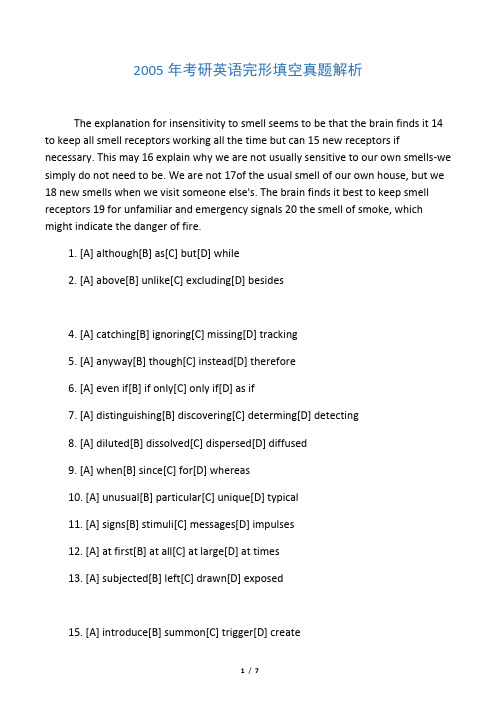
2005年考研英语完形填空真题解析The explanation for insensitivity to smell seems to be that the brain finds it 14 to keep all smell receptors working all the time but can 15 new receptors if necessary. This may 16 explain why we are not usually sensitive to our own smells-we simply do not need to be. We are not 17of the usual smell of our own house, but we 18 new smells when we visit someone else's. The brain finds it best to keep smell receptors 19 for unfamiliar and emergency signals 20 the smell of smoke, which might indicate the danger of fire.1. [A] although[B] as[C] but[D] while2. [A] above[B] unlike[C] excluding[D] besides4. [A] catching[B] ignoring[C] missing[D] tracking5. [A] anyway[B] though[C] instead[D] therefore6. [A] even if[B] if only[C] only if[D] as if7. [A] distinguishing[B] discovering[C] determing[D] detecting8. [A] diluted[B] dissolved[C] dispersed[D] diffused9. [A] when[B] since[C] for[D] whereas10. [A] unusual[B] particular[C] unique[D] typical11. [A] signs[B] stimuli[C] messages[D] impulses12. [A] at first[B] at all[C] at large[D] at times13. [A] subjected[B] left[C] drawn[D] exposed15. [A] introduce[B] summon[C] trigger[D] create16. [A] still[B] also[C] otherwise[D] nevertheless17. [A] sure[B] stick[C] aware[D] tired18. [A] tolerate[B] repel[C] neglect[D] notice19. [A] available[B] reliable[C] identifiable[D] suitable20. [A] similar to[B] such as[C] along with[D] aside from文章背景文章的主题是"人的鼻子",作者谈论的中心议题是"我们常常低估了鼻子的功能。
2005年考研英语完形填空真题解析
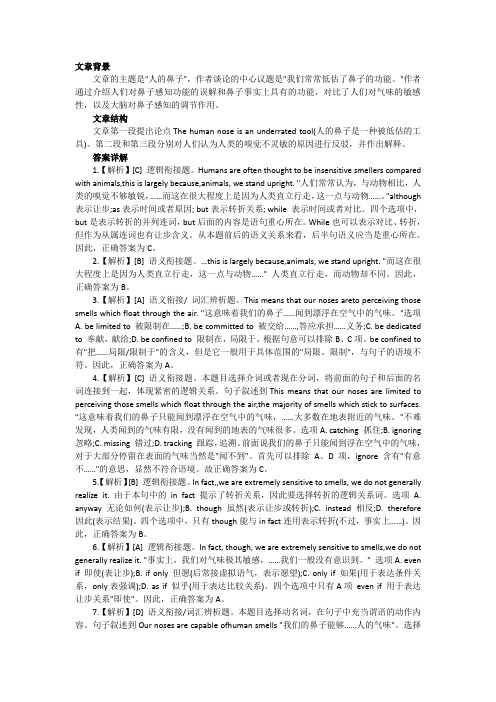
文章背景文章的主题是"人的鼻子",作者谈论的中心议题是"我们常常低估了鼻子的功能。
"作者通过介绍人们对鼻子感知功能的误解和鼻子事实上具有的功能,对比了人们对气味的敏感性,以及大脑对鼻子感知的调节作用。
文章结构文章第一段提出论点The human nose is an underrated tool(人的鼻子是一种被低估的工具)。
第二段和第三段分别对人们认为人类的嗅觉不灵敏的原因进行反驳,并作出解释。
答案详解1.【解析】[C] 逻辑衔接题。
Humans are often thought to be insensitive smellers compared with animals,this is largely because,animals, we stand upright. "人们常常认为,与动物相比,人类的嗅觉不够敏锐,……而这在很大程度上是因为人类直立行走,这一点与动物……。
"although 表示让步;as表示时间或者原因; but表示转折关系; while 表示时间或者对比。
四个选项中,but是表示转折的并列连词,but后面的内容是语句重心所在。
While也可以表示对比、转折,但作为从属连词也有让步含义。
从本题前后的语义关系来看,后半句语义应当是重心所在。
因此,正确答案为C。
2.【解析】[B] 语义衔接题。
…this is largely because,animals, we stand upright. "而这在很大程度上是因为人类直立行走,这一点与动物……" 人类直立行走,而动物却不同。
因此,正确答案为B。
3.【解析】[A] 语义衔接/ 词汇辨析题。
This means that our noses areto perceiving those smells which float through the air. "这意味着我们的鼻子……闻到漂浮在空气中的气味。
2005考研英语真题
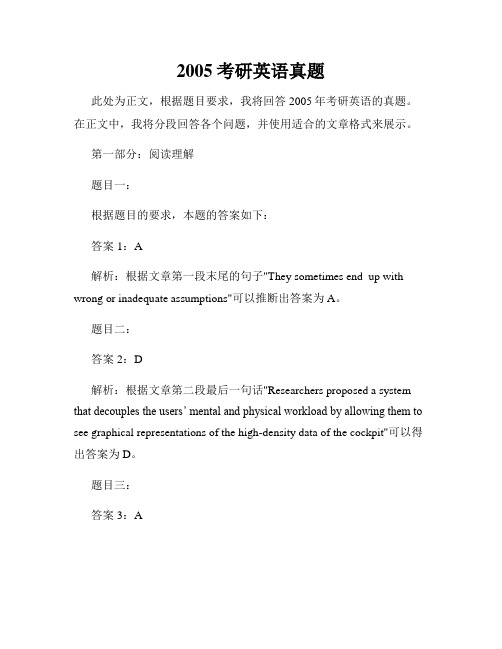
2005考研英语真题此处为正文,根据题目要求,我将回答2005年考研英语的真题。
在正文中,我将分段回答各个问题,并使用适合的文章格式来展示。
第一部分:阅读理解题目一:根据题目的要求,本题的答案如下:答案1:A解析:根据文章第一段末尾的句子"They sometimes end up with wrong or inadequate assumptions"可以推断出答案为A。
题目二:答案2:D解析:根据文章第二段最后一句话"Researchers proposed a system that decouples the users’ mental and physical workload by allowing them to see graphical representations of the high-density data of the cockpit"可以得出答案为D。
题目三:答案3:A解析:根据文章第三段最后一句话"The design of the new flight deck system should reduce their workload and improve their performance"可以得出答案为A。
第二部分:完形填空根据题目要求,我将继续回答完形填空部分的题目。
题目一:答案1:B解析:根据文章第一段的句子"The speaker, who is in the film development business, was talking about the importance of daring to take risks"可以推断出答案为B。
题目二:答案2:C解析:根据文章第三段的句子"The speaker said that when you take risks, you need to know when to call a halt to the operation"可以得出答案为C。
2005年考研英语完型阅读精解

2005年全国硕士研究生入学统一考试英语(一)试题答案详解Section I Use of English (10 points)1-5. CBACB 6-10. ADADB 11-15. CADCD 16-20. BCDABSection II Reading Comprehension (60 points)Part A (40 points) 21-25. CBACB 26-30. CDADB 31-35. ACDDA 36-40. BDABC Part B (10 points) 4 1-45. ECGFB Part C (10 points)46. 电视是创造和传递感情的手段之一。
也许在此之前,就加强不同的民族和国家之间的联系而言,电视还从来没有像在最近的欧洲事件中起过如此大的作用。
47. 多媒体集团在欧洲就像在其他地方一样越来越成功了。
这些集团把相互关系密切的电视台、电台、报纸、杂志、出版社整合到了一起。
48. 仅这一点就表明在电视行业不是一个容易生存的领域。
这个事实通过统计数字一目了然,统计表明在80家欧洲电视网中1989年出现亏损的不少于50%。
49. 创造一个尊重不同文化和传统的“欧洲统一体”绝非易事,需要战略性选择。
正是这些文化和传统组成了连接欧洲大陆的纽带。
50. 在应付一个如此规模的挑战过程中,我们可以毫不夸张地说,“团结,我们就会站起来;分裂,我们就会倒下去。
”Section I Use of English1. C 空格前讲的是,和动物相比,人的嗅觉常被认为不灵敏,空格后讲的是,…这主要是因为,…动物,我们是直立的。
由本段首句"人的鼻子是一个被低估的工具"可知,作者并不认同"人的嗅觉没有动物的灵敏"这一有关人类嗅觉的常规观点。
由此可推知,空格前后部分存在隐形的转折关系,即作者并不认为人的鼻子不灵敏,只不过因为人是直立的,故正确答案为C项。
2005年考研英语真题答案及解析
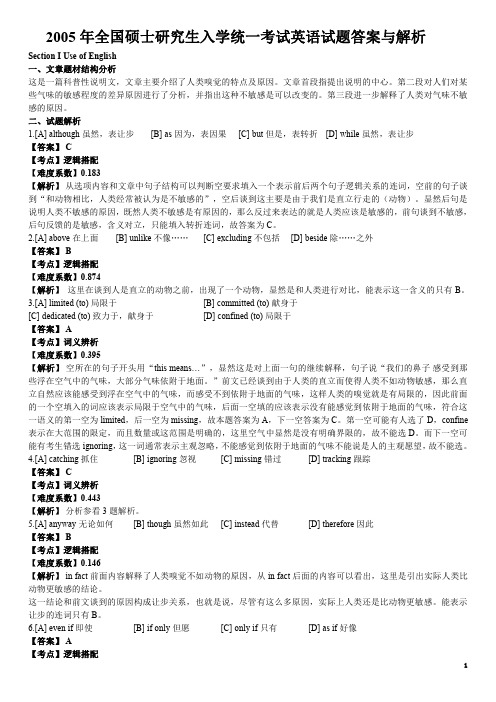
2005年全国硕士研究生入学统一考试英语试题答案与解析Section I Use of English一、文章题材结构分析这是一篇科普性说明文,文章主要介绍了人类嗅觉的特点及原因。
文章首段指提出说明的中心。
第二段对人们对某些气味的敏感程度的差异原因进行了分析,并指出这种不敏感是可以改变的。
第三段进一步解释了人类对气味不敏感的原因。
二、试题解析1.[A]although虽然,表让步[B]as因为,表因果[C]but但是,表转折[D]while虽然,表让步【答案】C【考点】逻辑搭配【难度系数】0.183【解析】从选项内容和文章中句子结构可以判断空要求填入一个表示前后两个句子逻辑关系的连词,空前的句子谈到“和动物相比,人类经常被认为是不敏感的”,空后谈到这主要是由于我们是直立行走的(动物)。
显然后句是说明人类不敏感的原因,既然人类不敏感是有原因的,那么反过来表达的就是人类应该是敏感的,前句谈到不敏感,后句反馈的是敏感,含义对立,只能填入转折连词,故答案为C。
2.[A]above在上面[B]unlike不像……[C]excluding不包括[D]beside除……之外【答案】B【考点】逻辑搭配【难度系数】0.874【解析】这里在谈到人是直立的动物之前,出现了一个动物,显然是和人类进行对比,能表示这一含义的只有B。
3.[A]limited(to)局限于[B]committed(to)献身于[C]dedicated(to)致力于,献身于[D]confined(to)局限于【答案】A【考点】词义辨析【难度系数】0.395【解析】空所在的句子开头用“this means…”,显然这是对上面一句的继续解释,句子说“我们的鼻子感受到那些浮在空气中的气味,大部分气味依附于地面。
”前文已经谈到由于人类的直立而使得人类不如动物敏感,那么直立自然应该能感受到浮在空气中的气味,而感受不到依附于地面的气味,这样人类的嗅觉就是有局限的,因此前面的一个空填入的词应该表示局限于空气中的气味,后面一空填的应该表示没有能感觉到依附于地面的气味,符合这一语义的第一空为limited,后一空为missing,故本题答案为A,下一空答案为C。
2005年英语全国卷一完型精心备课 带答案 精校无误
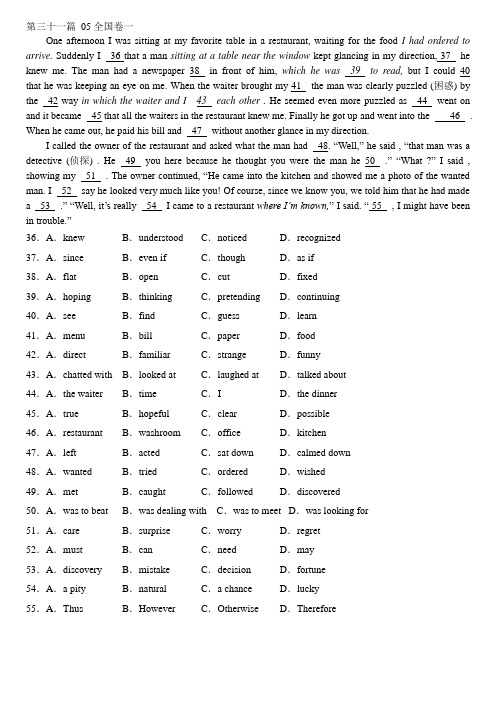
第三十一篇05全国卷一One afternoon I was sitting at my favorite table in a restaurant, waiting for the food I had ordered to arrive. Suddenly I 36that a man sitting at a table near the window kept glancing in my direction, 37 he knew me. The man had a newspaper 38 in front of him, which he was 39 to read, but I could 40 that he was keeping an eye on me. When the waiter brought my 41 the man was clearly puzzled (困惑) by the 42 way in which the waiter and I 43 each other . He seemed even more puzzled as 44 went on and it became 45 that all the waiters in the restaurant knew me. Finally he got up and went into the 46 . When he came out, he paid his bill and 47 without another glance in my direction.I called the owner of the restaurant and asked what the man had 48. “Well,” he said , “that man was a detective (侦探) . He 49 you here because he thought you were the man he 50 .” “What ?” I said , showing my 51 . The owner continued, “He came into the kitchen and showed me a photo of the wanted man. I 52 say he looked very much like you! Of course, since we know you, we told him that he had made a 53 .” “Well, it’s really 54 I came to a restaurant where I’m known,” I said. “ 55 , I might have been in trouble.”36.A.knew B.understood C.noticed D.recognized37.A.since B.even if C.though D.as if38.A.flat B.open C.cut D.fixed39.A.hoping B.thinking C.pretending D.continuing40.A.see B.find C.guess D.learn41.A.menu B.bill C.paper D.food42.A.direct B.familiar C.strange D.funny43.A.chatted with B.looked at C.laughed at D.talked about44.A.the waiter B.time C.I D.the dinner45.A.true B.hopeful C.clear D.possible46.A.restaurant B.washroom C.office D.kitchen47.A.left B.acted C.sat down D.calmed down48.A.wanted B.tried C.ordered D.wished49.A.met B.caught C.followed D.discovered50.A.was to beat B.was dealing with C.was to meet D.was looking for51.A.care B.surprise C.worry D.regret52.A.must B.can C.need D.may53.A.discovery B.mistake C.decision D.fortune54.A.a pity B.natural C.a chance D.lucky55.A.Thus B.However C.Otherwise D.Therefore第三十一篇05全国卷一One afternoon I was sitting at my favorite table in a restaurant, waiting for the food I had ordered to arrive. Suddenly I 36that a man sitting at a table near the window kept glancing in my direction, 37 he knew me. The man had a newspaper 38 in front of him, which he was 39 to read, but I could 40 that he was keeping an eye on me. When the waiter brought my 41 the man was clearly puzzled (困惑) by the 42 way in which the waiter and I 43 each other . He seemed even more puzzled as 44 went on and it became 45 that all the waiters in the restaurant knew me. Finally he got up and went into the 46 . When he came out, he paid his bill and 47 without another glance in my direction.I called the owner of the restaurant and asked what the man had 48. “Well,” he said , “that man was a detective (侦探) . He 49 you here because he thought you were the man he 50 .” “What ?” I said , showing my 51 . The owner continued, “He came into the kitchen and showed me a photo of the wanted man. I 52 say he looked very much like you! Of course, since we know you, we told him that he had made a 53 .” “Well, it’s really 54 I came to a restaurant where I’m known,” I said. “ 55 , I might have been in trouble.”36.A.knew B.understood C.noticed D.recognized37.A.since B.even if C.though D.as if38.A.flat B.open C.cut D.fixed39.A.hoping B.thinking C.pretending D.continuing40.A.see B.find C.guess D.learn41.A.menu B.bill C.paper D.food42.A.direct B.familiar C.strange D.funny43.A.chatted with B.looked at C.laughed at D.talked about44.A.the waiter B.time C.I D.the dinner45.A.true B.hopeful C.clear D.possible46.A.restaurant B.washroom C.office D.kitchen47.A.left B.acted C.sat down D.calmed down48.A.wanted B.tried C.ordered D.wished49.A.met B.caught C.followed D.discovered50.A.was to beat B.was dealing with C.was to meet D.was looking for51.A.care B.surprise C.worry D.regret52.A.must B.can C.need D.may53.A.discovery B.mistake C.decision D.fortune54.A.a pity B.natural C.a chance D.lucky55.A.Thus B.However C.Otherwise D.Therefore1.keep an eye on me2.stare at me3.glare at me4.glance in my direction5.the food I had ordered6. a wanted man7.notice8.note9.recognize10.even if 11.even though12.as if13.as though14.I am familiar with this city15.The city is familiar to me16.calm down17.make a fortune18.how did you deal with the cat?19.What did you do with the cat?the way作先行词,连词在从句中不作主不作宾作状用in which/that/省略连词在从句中作主或作宾语用that 作宾可省the man was clearly puzzled (困惑) by the 42 way in which the waiter and I 43 each other .1.If we want to have a bright future, we must learn to act in ways that do not harm other living things.2.Perhaps more importantly, new discoveries in genetics((超纲词基因学) and biochemistry (超纲词生物化学)may lead to changes in the way diseases are cured and medicines are made.3.What surprised me was not what he said but ______he said it. (04湖北)A.the way B.in the way that C.in the way D.the way which现在分词作定语a man sitting at a table near the window kept glancing in my direction1.When I was a boy growing up in New Jersey in the 1960s, we had a milkman delivering运送milk toour doorstep.2.The House has welcomed visitors traveling from all over the world, for over 250 years.ws areas地区without stricter严格的control need changing,4.Thousands of people living in the Chinese capital首都will celebrate庆祝the start of the Chinese NewYear by heading for the ski resorts(滑雪场).5.Lieberman was a real college student showing his classmates how to do things like make drinks out ofdining-hall fruit.6.My mother isn't the only one experiencing a fast personal growth period.Since引导的原因状语从句Of course, since we know you, we told him that he had made a 53 .”1.Since sharks(超纲鲨鱼) are heavier than water, they must swim continuously or they will sink to thebottom.2.Since you’ve learn Latin at your university, you must be able to translate it.3.Since the rain has stopped, let’s continue our work.[1999上海] ____________everybody knows about it, I don’t want to talk about it any more.A. ForB. EvenC. SinceD. However。
05年考研英语真题 答案
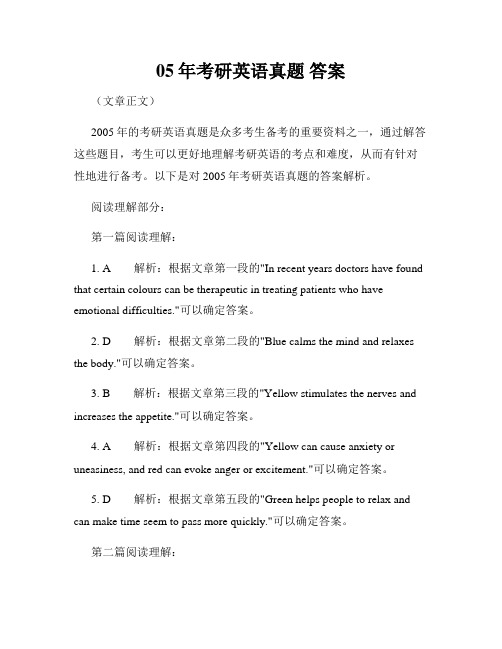
05年考研英语真题答案(文章正文)2005年的考研英语真题是众多考生备考的重要资料之一,通过解答这些题目,考生可以更好地理解考研英语的考点和难度,从而有针对性地进行备考。
以下是对2005年考研英语真题的答案解析。
阅读理解部分:第一篇阅读理解:1. A解析:根据文章第一段的"In recent years doctors have found that certain colours can be therapeutic in treating patients who have emotional difficulties."可以确定答案。
2. D解析:根据文章第二段的"Blue calms the mind and relaxes the body."可以确定答案。
3. B解析:根据文章第三段的"Yellow stimulates the nerves and increases the appetite."可以确定答案。
4. A解析:根据文章第四段的"Yellow can cause anxiety or uneasiness, and red can evoke anger or excitement."可以确定答案。
5. D解析:根据文章第五段的"Green helps people to relax and can make time seem to pass more quickly."可以确定答案。
第二篇阅读理解:6. B解析:根据文章第一段的"The needs for exercise decrease over time."可以确定答案。
7. D解析:根据文章第二段的"A calorie is a measure of the amount of energy in food"可以确定答案。
2005年考研英语完形填空真题解析
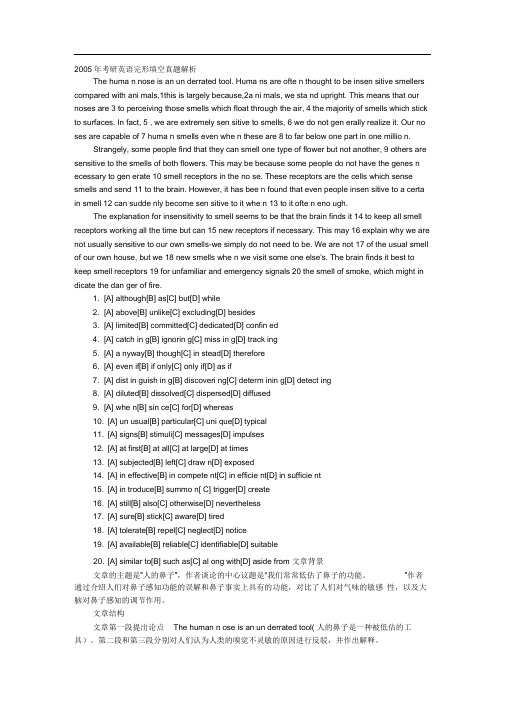
2005年考研英语完形填空真题解析The huma n nose is an un derrated tool. Huma ns are ofte n thought to be insen sitive smellers compared with ani mals,1this is largely because,2a ni mals, we sta nd upright. This means that our noses are 3 to perceiving those smells which float through the air, 4 the majority of smells which stick to surfaces. In fact, 5 , we are extremely sen sitive to smells, 6 we do not gen erally realize it. Our no ses are capable of 7 huma n smells even whe n these are 8 to far below one part in one millio n.Strangely, some people find that they can smell one type of flower but not another, 9 others are sensitive to the smells of both flowers. This may be because some people do not have the genes n ecessary to gen erate 10 smell receptors in the no se. These receptors are the cells which sense smells and send 11 to the brain. However, it has bee n found that even people insen sitive to a certa in smell 12 can sudde nly become sen sitive to it whe n 13 to it ofte n eno ugh.The explanation for insensitivity to smell seems to be that the brain finds it 14 to keep all smell receptors working all the time but can 15 new receptors if necessary. This may 16 explain why we are not usually sensitive to our own smells-we simply do not need to be. We are not 17 of the usual smell of our own house, but we 18 new smells whe n we visit some one else's. The brain finds it best to keep smell receptors 19 for unfamiliar and emergency signals 20 the smell of smoke, which might in dicate the dan ger of fire.1. [A] although[B] as[C] but[D] while2. [A] above[B] unlike[C] excluding[D] besides3. [A] limited[B] committed[C] dedicated[D] confin ed4. [A] catch in g[B] ignorin g[C] miss in g[D] track ing5. [A] a nyway[B] though[C] in stead[D] therefore6. [A] even if[B] if only[C] only if[D] as if7. [A] dist in guish in g[B] discoveri ng[C] determ inin g[D] detect ing8. [A] diluted[B] dissolved[C] dispersed[D] diffused9. [A] whe n[B] sin ce[C] for[D] whereas10. [A] un usual[B] particular[C] uni que[D] typical11. [A] signs[B] stimuli[C] messages[D] impulses12. [A] at first[B] at all[C] at large[D] at times13. [A] subjected[B] left[C] draw n[D] exposed14. [A] in effective[B] in compete nt[C] in efficie nt[D] in sufficie nt15. [A] in troduce[B] summo n[ C] trigger[D] create16. [A] still[B] also[C] otherwise[D] nevertheless17. [A] sure[B] stick[C] aware[D] tired18. [A] tolerate[B] repel[C] neglect[D] notice19. [A] available[B] reliable[C] identifiable[D] suitable20. [A] similar to[B] such as[C] al ong with[D] aside from 文章背景文章的主题是”人的鼻子”,作者谈论的中心议题是"我们常常低估了鼻子的功能。
2005年考研英语完型阅读精解

2005年全国硕士研究生入学统一考试英语(一)试题答案详解Section I Use of English (10 points)1-5. CBACB 6-10. ADADB 11-15. CADCD 16-20. BCDABSection II Reading Comprehension (60 points)Part A (40 points) 21-25. CBACB 26-30. CDADB 31-35. ACDDA 36-40. BDABC Part B (10 points) 4 1-45. ECGFB Part C (10 points)46. 电视是创造和传递感情的手段之一。
也许在此之前,就加强不同的民族和国家之间的联系而言,电视还从来没有像在最近的欧洲事件中起过如此大的作用。
47. 多媒体集团在欧洲就像在其他地方一样越来越成功了。
这些集团把相互关系密切的电视台、电台、报纸、杂志、出版社整合到了一起。
48. 仅这一点就表明在电视行业不是一个容易生存的领域。
这个事实通过统计数字一目了然,统计表明在80家欧洲电视网中1989年出现亏损的不少于50%。
49. 创造一个尊重不同文化和传统的“欧洲统一体”绝非易事,需要战略性选择。
正是这些文化和传统组成了连接欧洲大陆的纽带。
50. 在应付一个如此规模的挑战过程中,我们可以毫不夸张地说,“团结,我们就会站起来;分裂,我们就会倒下去。
”Section I Use of English1. C 空格前讲的是,和动物相比,人的嗅觉常被认为不灵敏,空格后讲的是,…这主要是因为,…动物,我们是直立的。
由本段首句"人的鼻子是一个被低估的工具"可知,作者并不认同"人的嗅觉没有动物的灵敏"这一有关人类嗅觉的常规观点。
由此可推知,空格前后部分存在隐形的转折关系,即作者并不认为人的鼻子不灵敏,只不过因为人是直立的,故正确答案为C项。
2005text2考研英语解析
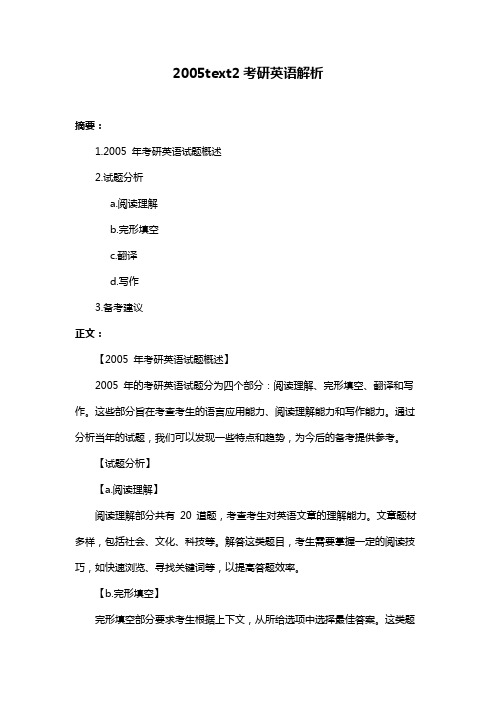
2005text2考研英语解析摘要:1.2005 年考研英语试题概述2.试题分析a.阅读理解b.完形填空c.翻译d.写作3.备考建议正文:【2005 年考研英语试题概述】2005 年的考研英语试题分为四个部分:阅读理解、完形填空、翻译和写作。
这些部分旨在考查考生的语言应用能力、阅读理解能力和写作能力。
通过分析当年的试题,我们可以发现一些特点和趋势,为今后的备考提供参考。
【试题分析】【a.阅读理解】阅读理解部分共有20 道题,考查考生对英语文章的理解能力。
文章题材多样,包括社会、文化、科技等。
解答这类题目,考生需要掌握一定的阅读技巧,如快速浏览、寻找关键词等,以提高答题效率。
【b.完形填空】完形填空部分要求考生根据上下文,从所给选项中选择最佳答案。
这类题目主要考查考生的语言应用能力,包括词汇、语法和逻辑推理等方面。
备考时,考生需要注重积累词汇和语法知识,同时培养逻辑思维能力。
【c.翻译】翻译部分要求考生将中文翻译成英文或英文翻译成中文。
这部分题目旨在考查考生的语言表达能力。
在备考过程中,考生需要注重中英文的转换,尤其是长句和复杂句的翻译。
此外,考生还需要积累一些翻译技巧,如固定搭配、词汇替换等。
【d.写作】写作部分分为小作文和大作文。
小作文主要考查考生的书信写作能力,如感谢信、道歉信等。
大作文则要求考生根据所给话题,进行议论文写作。
在备考过程中,考生需要掌握一定的写作技巧,如段落划分、论证方法等。
同时,考生还需要积累一些写作素材,如名言警句、事例等。
【备考建议】1.注重基础知识,如词汇、语法等。
2.培养阅读和写作技巧,提高答题效率。
3.注重实际应用,进行大量的练习。
4.关注历年真题,了解考试趋势。
5.调整心态,保持良好的学习状态。
通过以上分析,我们可以发现2005 年考研英语试题对考生的语言应用能力、阅读理解能力和写作能力提出了较高的要求。
因此,在备考过程中,考生需要注重基础知识的学习,同时培养阅读和写作技巧。
- 1、下载文档前请自行甄别文档内容的完整性,平台不提供额外的编辑、内容补充、找答案等附加服务。
- 2、"仅部分预览"的文档,不可在线预览部分如存在完整性等问题,可反馈申请退款(可完整预览的文档不适用该条件!)。
- 3、如文档侵犯您的权益,请联系客服反馈,我们会尽快为您处理(人工客服工作时间:9:00-18:30)。
2005年考研英语完形填空真题解析The human nose is an underrated tool. Humans are often thought to be insensitive smellers compared with animals,1this is largely because,2animals, we stand upright. This means that our noses are 3 to perceiving those smells which float through the air, 4 the majority of smells which stick to surfaces. In fact, 5 , we are extremely sensitive to smells, 6 we do not generally realize it. Our noses are capable of 7 human smells even when these are 8 to far below one part in one million.Strangely, some people find that they can smell one type of flower but not another, 9 others are sensitive to the smells of both flowers. This may be because some people do not have the genes necessary to generate 10 smell receptors in the nose. These receptors are the cells which sense smells and send 11 to the brain. However, it has been found that even people insensitive to a certain smell 12 can suddenly become sensitive to it when 13 to it often enough.The explanation for insensitivity to smell seems to be that the brain finds it 14 to keep all smell receptors working all the time but can 15 new receptors if necessary. This may 16 explain why we are not usually sensitive to our own smells-we simply do not need to be. We are not 17 of the usual smell of our own house, but we 18 new smells when we visit someone else's. The brain finds it best to keep smell receptors 19 for unfamiliar and emergency signals 20 the smell of smoke, which might indicate the danger of fire.1. [A] although[B] as[C] but[D] while2. [A] above[B] unlike[C] excluding[D] besides3. [A] limited[B] committed[C] dedicated[D] confined4. [A] catching[B] ignoring[C] missing[D] tracking5. [A] anyway[B] though[C] instead[D] therefore6. [A] even if[B] if only[C] only if[D] as if7. [A] distinguishing[B] discovering[C] determining[D] detecting8. [A] diluted[B] dissolved[C] dispersed[D] diffused9. [A] when[B] since[C] for[D] whereas10. [A] unusual[B] particular[C] unique[D] typical11. [A] signs[B] stimuli[C] messages[D] impulses12. [A] at first[B] at all[C] at large[D] at times13. [A] subjected[B] left[C] drawn[D] exposed14. [A] ineffective[B] incompetent[C] inefficient[D] insufficient15. [A] introduce[B] summon[C] trigger[D] create16. [A] still[B] also[C] otherwise[D] nevertheless17. [A] sure[B] stick[C] aware[D] tired18. [A] tolerate[B] repel[C] neglect[D] notice19. [A] available[B] reliable[C] identifiable[D] suitable20. [A] similar to[B] such as[C] along with[D] aside from文章背景文章的主题是"人的鼻子",作者谈论的中心议题是"我们常常低估了鼻子的功能。
"作者通过介绍人们对鼻子感知功能的误解和鼻子事实上具有的功能,对比了人们对气味的敏感性,以及大脑对鼻子感知的调节作用。
文章结构文章第一段提出论点The human nose is an underrated tool(人的鼻子是一种被低估的工具)。
第二段和第三段分别对人们认为人类的嗅觉不灵敏的原因进行反驳,并作出解释。
答案详解1.【解析】[C] 逻辑衔接题。
Humans are often thought to be insensitive smellers compared with animals,this is largely because,animals, we stand upright. "人们常常认为,与动物相比,人类的嗅觉不够敏锐,……而这在很大程度上是因为人类直立行走,这一点与动物……。
"although 表示让步;as表示时间或者原因; but表示转折关系; while 表示时间或者对比。
四个选项中,but是表示转折的并列连词,but后面的内容是语句重心所在。
While也可以表示对比、转折,但作为从属连词也有让步含义。
从本题前后的语义关系来看,后半句语义应当是重心所在。
因此,正确答案为C。
2.【解析】[B] 语义衔接题。
…this is largely because,animals, we stand upright. "而这在很大程度上是因为人类直立行走,这一点与动物……" 人类直立行走,而动物却不同。
因此,正确答案为B。
3.【解析】[A] 语义衔接/ 词汇辨析题。
This means that our noses areto perceiving those smells which float through the air. "这意味着我们的鼻子……闻到漂浮在空气中的气味。
"选项A. be limited to 被限制在……;B. be committed to 被交给……,答应承担……义务;C. be dedicated to 奉献,献给;D. be confined to 限制在,局限于。
根据句意可以排除B、C项。
be confined to有"把……局限/限制于"的含义,但是它一般用于具体范围的"局限、限制",与句子的语境不符。
因此,正确答案为A。
4.【解析】[C] 语义衔接题。
本题目选择介词或者现在分词,将前面的句子和后面的名词连接到一起,体现紧密的逻辑关系。
句子叙述到This means that our noses are limited to perceiving those smells which float through the air,the majority of smells which stick to surfaces. "这意味着我们的鼻子只能闻到漂浮在空气中的气味,……大多数在地表附近的气味。
"不难发现,人类闻到的气味有限,没有闻到的地表的气味很多。
选项 A. catching 抓住;B. ignoring 忽略;C. missing 错过;D. tracking 跟踪,追溯。
前面说我们的鼻子只能闻到浮在空气中的气味,对于大部分停留在表面的气味当然是"闻不到"。
首先可以排除A、D项,ignore含有"有意不……"的意思,显然不符合语境。
故正确答案为C。
5.【解析】[B] 逻辑衔接题。
In fact,,we are extremely sensitive to smells, we do not generally realize it. 由于本句中的in fact提示了转折关系,因此要选择转折的逻辑关系词。
选项 A. anyway 无论如何(表示让步);B. though 虽然(表示让步或转折);C. instead 相反;D. therefore 因此(表示结果)。
四个选项中,只有though能与in fact连用表示转折(不过,事实上……)。
因此,正确答案为B。
6.【解析】[A] 逻辑衔接题。
In fact, though, we are extremely sensitive to smells,we do not generally realize it. "事实上,我们对气味极其敏感,……我们一般没有意识到。
" 选项A. even if 即使(表让步);B. if only 但愿(后常接虚拟语气,表示愿望);C. only if 如果(用于表达条件关系,only表强调);D. as if 似乎(用于表达比较关系)。
